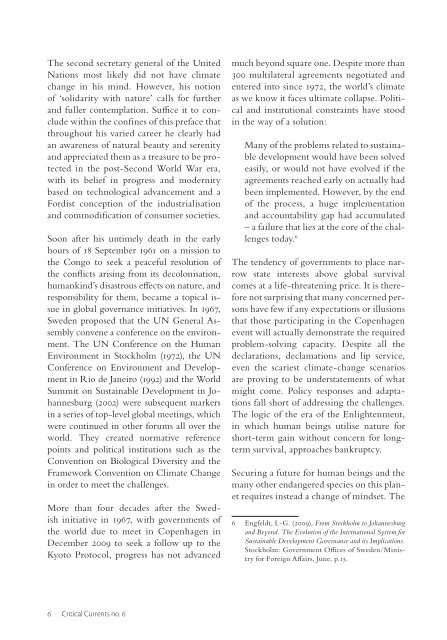Contours of Climate Justice - Dag Hammarskjöld Foundation
Contours of Climate Justice - Dag Hammarskjöld Foundation
Contours of Climate Justice - Dag Hammarskjöld Foundation
Create successful ePaper yourself
Turn your PDF publications into a flip-book with our unique Google optimized e-Paper software.
The second secretary general <strong>of</strong> the United<br />
Nations most likely did not have climate<br />
change in his mind. However, his notion<br />
<strong>of</strong> ‘solidarity with nature’ calls for further<br />
and fuller contemplation. Suffi ce it to conclude<br />
within the confi nes <strong>of</strong> this preface that<br />
throughout his varied career he clearly had<br />
an awareness <strong>of</strong> natural beauty and serenity<br />
and appreciated them as a treasure to be protected<br />
in the post-Second World War era,<br />
with its belief in progress and modernity<br />
based on technological advancement and a<br />
Fordist conception <strong>of</strong> the industrialisation<br />
and commodifi cation <strong>of</strong> consumer societies.<br />
Soon after his untimely death in the early<br />
hours <strong>of</strong> 18 September 1961 on a mission to<br />
the Congo to seek a peaceful resolution <strong>of</strong><br />
the confl icts arising from its decolonisation,<br />
humankind’s disastrous eff ects on nature, and<br />
responsibility for them, became a topical issue<br />
in global governance initiatives. In 1967,<br />
Sweden proposed that the UN General Assembly<br />
convene a conference on the environment.<br />
The UN Conference on the Human<br />
Environment in Stockholm (1972), the UN<br />
Conference on Environment and Development<br />
in Rio de Janeiro (1992) and the World<br />
Summit on Sustainable Development in Johannesburg<br />
(2002) were subsequent markers<br />
in a series <strong>of</strong> top-level global meetings, which<br />
were continued in other forums all over the<br />
world. They created normative reference<br />
points and political institutions such as the<br />
Convention on Biological Diversity and the<br />
Framework Convention on <strong>Climate</strong> Change<br />
in order to meet the challenges.<br />
More than four decades after the Swedish<br />
initiative in 1967, with governments <strong>of</strong><br />
the world due to meet in Copenhagen in<br />
December 2009 to seek a follow up to the<br />
Kyoto Protocol, progress has not advanced<br />
6 Critical Currents no. 6<br />
much beyond square one. Despite more than<br />
300 multilateral agreements negotiated and<br />
entered into since 1972, the world’s climate<br />
as we know it faces ultimate collapse. Political<br />
and institutional constraints have stood<br />
in the way <strong>of</strong> a solution:<br />
Many <strong>of</strong> the problems related to sustainable<br />
development would have been solved<br />
easily, or would not have evolved if the<br />
agreements reached early on actually had<br />
been implemented. However, by the end<br />
<strong>of</strong> the process, a huge implementation<br />
and accountability gap had accumulated<br />
– a failure that lies at the core <strong>of</strong> the challenges<br />
today. 6<br />
The tendency <strong>of</strong> governments to place narrow<br />
state interests above global survival<br />
comes at a life-threatening price. It is therefore<br />
not surprising that many concerned persons<br />
have few if any expectations or illusions<br />
that those participating in the Copenhagen<br />
event will actually demonstrate the required<br />
problem-solving capacity. Despite all the<br />
declarations, declamations and lip service,<br />
even the scariest climate-change scenarios<br />
are proving to be understatements <strong>of</strong> what<br />
might come. Policy responses and adaptations<br />
fall short <strong>of</strong> addressing the challenges.<br />
The logic <strong>of</strong> the era <strong>of</strong> the Enlightenment,<br />
in which human beings utilise nature for<br />
short-term gain without concern for longterm<br />
survival, approaches bankruptcy.<br />
Securing a future for human beings and the<br />
many other endangered species on this planet<br />
requires instead a change <strong>of</strong> mindset. The<br />
6 Engfeldt, L-G. (2009), From Stockholm to Johannesburg<br />
and Beyond. The Evolution <strong>of</strong> the International System for<br />
Sustainable Development Governance and its Implications.<br />
Stockholm: Government Offi ces <strong>of</strong> Sweden/Ministry<br />
for Foreign Aff airs, June, p.15.
















